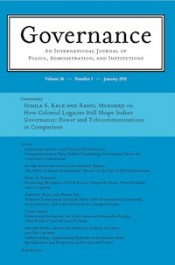Disability reform in the Netherlands: Kurzer responds
In a recent article in Governance, Paulette Kurzer examined the politics of disability reform in the Netherlands. Last week, Jan-Maarten van Sonsbeek and Raymond Gradus provided a comment on the Governance blog about Kurzer’s argument. Here, Kurzer replies.
Dr. Jan-Maarten van Sonsbeek and Professor Raymond Gradus recently raised some questions about my argument presented in my Governance article, Disability reform in the Netherlands. They claim that the reason for the successful passing of the substantial reforms of the disability insurance fund is primarily due to the structure and details of the new law. The new legislation clearly differentiated between the severely disabled and other forms of disability and built upon years of smaller tweaks and reforms. They believe that the 2006 reforms did not provoke an electoral backlash or voter resistance because of its smart design. They would argue that the reforms incorporated a logic that convinced the social partners and voters to go along with the new legislation.
My article has little to say about the actual content of the new legislation. I have no disagreements with the argument that the 2006 reforms made intuitive sense because it drew a sharp distinction between the severely disabled who would never be able to enter the labor market. I think we are also in agreement that there was a broad consensus in Dutch society that the disability scheme had to be overhauled. We disagree on why there was that consensus in the first place.
I make the argument that Dutch society/voters increasingly embraced views and attitudes that the literature describes as welfare chauvinism. Benefits, especially super generous benefits with few strings attached should go to those who are deserving. Minorities who fail to integrate and assimilate are non-deserving. As a rule, welfare benefits in the Netherlands (and other European countries) are divorced from the origin of the claimant. They are universal. Solidarity meant that voters tolerated the generosity of disability claims even when it was obvious that many ‘disabled’ could possibly have found other kinds of employment or were not fully disabled. It was this permissive consensus (to use a term from another debate) that made it difficult to introduce more coercive, less generous measures and tighten the eligibility criteria of the disability insurance fund.
However, a substantial minority of Dutch voters harbored many reservations about multiculturalism and non-Western immigrants. The radical rightwing parties of Pim Fortuyn and Geert Wilders exploited these attitudes and opinions. There is no reason to rehash the topic in this blog. Suffice to say that a sizable minority in the Dutch electorate struggled with the concept that minorities enjoy the same rights as native Dutch when in fact the former fail to meet their societal obligations. These obligations include assimilation and integration into Dutch society.
Van Sonsbeek and Gradus claim that public opinion did not change much even after government studies officially confirmed that older Turkish and Moroccan immigrants were disproportionaly dependent on social security benefits. However, public opinion polls and survey data collected by Willem de Koster, Peter Achterberg, Jeroen van der Waal Dick Houtman and Anton Derks (among other scholars) show that attitudes did change in fact. Changed attitudes provided fertile ground for radical rightwing discourse, which legitimized a debate that welfare benefits should go to native Dutch who are deserving because they are productive and contributing members of society. My article is based on the public opinion surveys and data of other Dutch academics. They show that a sizable minority of Dutch voters increasingly differentiated between deserving and non-deserving benefit claimants and that the distinction rested on whether a person was native-born or not.
Indeed, the social partners signed off on the reforms because societal attitudes had shifted with regard to the fundamental structure of the disability insurance fund. Van Sonsbeek and Gradus conclude that the 2006 reform was accepted because of the structure and intent of the new law was based on an unassailable logic that made sense to voters. The design was smart. They may be right that the design was smart. In political life, however, major reforms are not assessed on the basis of their smartness. History is littered with examples of smart legislation that went nowhere. Rather, voters felt ambivalent about a program that seemed to legitimize fraud and cheating and that provided generous benefits to working-aged minorities who had failed to uphold their side of the societal bargain. That bargain meant integration in Dutch society. As in other European countries, there is a group of voters that is hyper critical of a welfare stat that fails to restrict welfare entitlements to the native population.
That is the basis for the consensus. Politicians and stakeholders found it difficult to defend a system that had fallen out of favor with precisely the kind of voter who is considered the main beneficiary of welfare benefits. The Netherlands is not unique. In Denmark, reforms have tied the length of one’s residency to benefit eligibility. The new formulation mostly excludes foreign-born immigrants. In many countries, a backlash has taken place against immigrants and that backlash implicates the social welfare state.
Paulette Kurzer is a professor in the School of Government and Public Policy at the University of Arizona.

